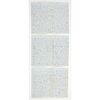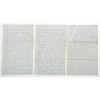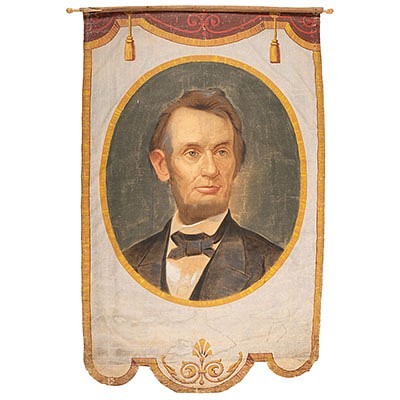[CIVIL WAR]. ECCLESTON, Sgt. Norris (1842-1897). 1st Delaware Infantry, 12pp Letter Describing Battles of the Wilderness and Spotsylvania Court House.
About Seller
6270 Este Ave.
Cincinnati , OH 45232
United States
With offices in Cincinnati, Cleveland and Denver, Cowan’s holds over 40 auctions each year, with annual sales exceeding $16M. We reach buyers around the globe, and take pride in our reputation for integrity, customer service and great results. A full-service house, Cowan’s Auctions specializes in Am...Read more
Two ways to bid:
- Leave a max absentee bid and the platform will bid on your behalf up to your maximum bid during the live auction.
- Bid live during the auction and your bids will be submitted real-time to the auctioneer.
Bid Increments
| Price | Bid Increment |
|---|---|
| $0 | $25 |
| $500 | $50 |
| $1,000 | $100 |
| $2,000 | $250 |
| $5,000 | $500 |
| $10,000 | $1,000 |
| $20,000 | $2,500 |
| $50,000 | $5,000 |
| $100,000 | $10,000 |
About Auction
Jun 25, 2021
The June 25 American Historical Ephemera and Photography Auction features an exciting assemblage of 18th-early 20th century material, including Civil War archives, Early Photography, Western Americana, Autographs and Manuscripts, and more. Cowan's Auctions dawnie@cowans.com
- Lot Description
Norris Palmer Eccleston (1842-1897) (sometimes listed as Morris) enlisted in the 1st Delaware Infantry 22 May 1861 as a private for a 3-month term of service. This experience gave him an advantage in August when he re-enlisted in the 1st Delaware, this time as a Corporal. He would finish his service as a Sergeant. This regiment saw many of the large battles in the Eastern Theater: Antietam, Fredericksburg, Chancellorsville, Gettysburg, Wilderness, Spotsylvania, North Anna River, Cold Harbor, Hatcher's Run, Appomattox, to name just a few. They participated in the Grand Review in Washington before mustering out in July 1865.
Although we have not found a record of it, he likely veteranized in January 1864, as did many of the early 3-year units. And they did so just in time for a bloody spring campaign from the Rapidan to the James Rivers in May and half of June after spending the winter near Stevensburg, Va. In this 12-page letter to his mother, Eccleston describes the battles.
"Camp -- I don't know where, May 14th, 1864. ...On the eve of the third of May, we received orders to be ready to March at 10 PM... We marched all night and crossed Ely's Ford at 10 AM on the 4th. At about 1 PM we passed the memorable field of Chancellorsville Their [sic] I saw the very spot on which I stood and fought just one year and one day before, everything gave token of the struggle which had their taken place, old pieces of muskets, bits of shell, old knapsacks, canteens, haversacks, &c were strewn over the field...
"Well, we marched about one mile ... and stopped for the night. There I saw many skulls and human bones. I saw a man in an Ohio Regt. stirring up the fire with a man's Thigh Bone. Such things look bad, don't they?" They marched several more miles and came "to a place called the Wilderness. Here we engaged the enemy and drove him about half a mile, then lay in line of battle all night - early the next morning (the 6th) we advanced and drove the enemy about two miles. The musketry here was terrific in the afternoon The fighting, if anything, was worse than before. We lost two men killed and seven wounded out of about thirty in our company. About three or four o'clock, the Rebs got the best of us and drove us from what we gained in the morning. They then massed their troops an charged our line but they were drove back with fearful slaughter....
"...the next morning...we marched about 3 miles, the enemy having changed his position. we skirmished in the afternoon and rested at night in line of battle.' They got a bit of rest, then "On the morning of the 9th...we were ordered to the left of the line where we threw up breastworks. In the afternoon we supported a charge made by the first Division of our corps and drove the Rebs across a stream near Spotsylvania Court House, the name of the stream or creek I forget....in the morning we advanced a little ways and our Batteries opened fire on the Rebs....then we went to support the 5th corps which was being pretty roughly handled by the Rebs. Our Brigade was ordered in where the hottest fighting was, and we drove the Rebs to their breastworks....At about 5PM we were ordered to charge and drive them from their works. We charged - but was drove back to our own [breastworks]. Colonel Woodall was wounded in the leg on this charge. Lieut Steel was killed. The fire was one continuous stream from one end of our line to the other, the bullets whistled around our heads like Bees....
"When we got back to our breastworks our boys swore they would not charge them again, if they were shot for refusing.
"We lay there until 10 o'clock in the evening [the next day] when we were ordered to get up and make as little noise as possible... We marched down the line about five miles and stoped [sic], ...we lay down until daylight when we charged the enemy and before evening our corps had captured seven thousand (7,000) Prisoners and thirty five pieces of artillery. What do you think of that for the old 2nd Corps? Ain't that doing it? ...on the 13th (yesterday) we skirmished all the afternoon. Today we are laying still, but there is fighting on our left. This is the 10th day of the fight - this beats the seven days fight all to pieces. There will be about two more fights here before we quit and that will finish the fighting here,.. Your affectionate Son, Norris"
After the war, Norris seems to have become a carriage painter. He married Lillian Brantley Husted and had two children, one girl and one boy, Lucy and James. He died in Philadelphia in 1897. - Shipping Info
-
SHIPPING & PICKUPS Cowan’s Cincinnati Office offers an in-house, full-service shipping department which is unparalleled in the auction industry. Shipping costs are provided with your finalized invoice 24-48 hours after auction. For furniture and oversized items, we recommend using third-party services. For more information, contact cowansshipping@hindmanauctions.com. NOTE: All pickups and preview are by appointment only. To make an appointment, please call 513-871-1670 or email cincinnati@hindmanauctions.com Buyers are required to pay for all packing, shipping and insurance charges. Overseas duty charges are the responsibility of the successful Bidder. Be aware that for larger and/or valuable items, shipping charges can be substantial. - Shipping charges include insurance for your order while in transit. If you have private insurance we will adjust your charge to include only packing and shipping. - Please allow 14 – 21 days after payment to package and ship your purchase as carefully as possible.
-
- Buyer's Premium



 EUR
EUR CAD
CAD AUD
AUD GBP
GBP MXN
MXN HKD
HKD CNY
CNY MYR
MYR SEK
SEK SGD
SGD CHF
CHF THB
THB![[CIVIL WAR]. ECCLESTON, Sgt. Norris (1842-1897). 1st Delaware Infantry, 12pp Letter Describing Battles of the Wilderness and Spotsylvania Court House.](https://s1.img.bidsquare.com/item/l/8589/8589762.jpeg?t=1LMY9Q)
![[CIVIL WAR]. ECCLESTON, Sgt. Norris (1842-1897). 1st Delaware Infantry, 12pp Letter Describing Battles of the Wilderness and Spotsylvania Court House.](https://s1.img.bidsquare.com/item/s/8589/8589762.jpeg?t=1LMY9Q)












